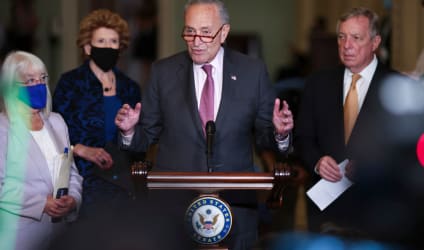Free Community College Cut From Biden’s Economic Plan
Writer
Writer
www.bestcolleges.com is an advertising-supported site. Featured or trusted partner programs and all school search, finder, or match results are for schools that compensate us. This compensation does not influence our school rankings, resource guides, or other editorially-independent information published on this site.
Turn Your Dreams Into Reality
Take our quiz and we'll do the homework for you! Compare your school matches and apply to your top choice today.
- Free community college has been cut from Biden's spending bill to win support from moderates.
- Rep. Ro Khanna said leadership was instead working to create community college scholarships.
- Democrats may continue to press for free community college through the America's College Promise Act, reintroduced in April.
Democrats' plan to provide free community college nationwide is off the table, at least for now.
Most of President Joe Biden's domestic legislative agenda, including free community college, is wrapped up in an immense spending package currently being negotiated by Democrats in the U.S. Senate. In a bid to get the buy-in of moderate senators, Biden is reportedly scrapping the provision, which was budgeted to cost more than $45 billion.
Rep. Ro Khanna, D-Calif., confirmed to CNN's Jake Tapper that the free tuition proposal was being removed from the spending bill and has morphed instead into a plan to provide community college scholarships. He did not, however, disclose any specifics of said scholarships, noting that the deal is still being finalized.
This news comes after months of negotiations over the spending package, dubbed the Build Back Better Act, which passed the U.S. House last August but has struggled to gain the necessary support in the Senate. Democrats control 50 seats in the chamber and hope to pass the bill through reconciliation.
However, moderate Democratic senators Kyrsten Sinema of Arizona and Joe Manchin of West Virginia have voiced opposition to significant portions of the sweeping economic plan.
Manchin, specifically, has expressed concerns over the free community college proposal. He previously told Education Secretary Miguel Cardona that he would instead prefer making student loans used for community college forgivable, which he suggested would motivate students to complete the program.
“Don't give it on the front end. Let them earn it on the back end.”
— Joe Manchin, Democratic Senator of West Virginia
"Don't give it on the front end. Let them earn it on the back end," Manchin said to Cardona at a June Senate Appropriations subcommittee hearing.
Community college scholarships may be a compromise between progressive and moderate Democrats. However, details about how much funds will be allocated for these scholarships have yet to be released. Khanna told CNN only that there will be "some funding" for these scholarships.
Overall, Democrats are slashing more than $1.5 trillion in spending from the economic plan, which was initially tagged to cost $3.5 trillion, CNBC reported. Biden told progressive Democrats this week that the bill could now cost between $1.75 trillion and $1.9 trillion.
Free community college was the only higher education issue addressed in the Build Back Better Act.
Free community college is a popular policy, with a June BestColleges survey finding 69% of respondents in favor of free community college for either all or most first-time college students.
There are other avenues to make community college free for all Americans, such as former President Barack Obama's America's College Promise Act, first introduced in 2015. Democrats reintroduced the legislative proposal in April.
Through this proposal, states would have to eliminate community college tuition in order to receive funding from the federal government, which would cover states' costs for community college tuition during the first year of the plan. The federal government's investment would reduce 5% each year over the next four years. Then the state would be left to cover 20% of the costs for free community college.
Feature Image: Kent Nishimura / Contributor / Los Angeles Times / Getty Images






